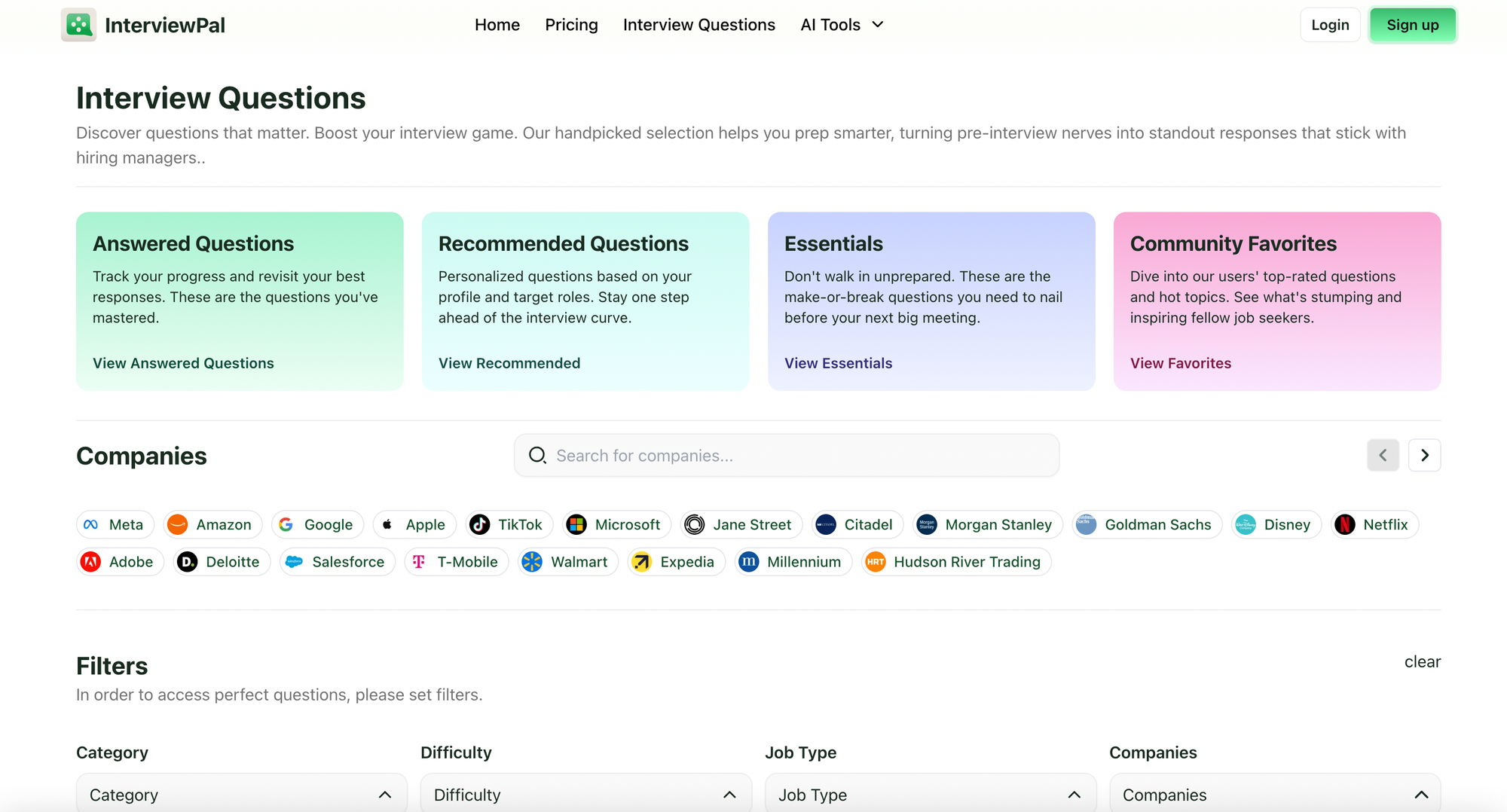Picture this: You're sitting in a plush chair at Google's headquarters, with your palms sweaty and heart racing. Across from you, a seasoned interviewer smiles and says, "Tell me about a time when..." And just like that, you're in the behavioral interview thunderdome. Two candidates enter, one job offer leaves.
Okay, maybe it's not that dramatic, but it sure can feel like it. As someone who's been on both sides of the table - trembling candidate and ruthless interviewer (kidding, I was a softie) - I'm here to spill the tea on acing behavioral interviews at tech giants. Let's dive in...
The Behavioral Interview: Not Your Father's "Where do you see yourself in five years?"
First things first - what the heck is a behavioral interview? It's like a first date, but instead of asking about your hobbies, they're probing into your work history to see if you're marriage material (professionally speaking, of course).
The premise is simple: past behavior predicts future performance. So when an interviewer at Amazon asks you about a time you disagreed with your boss, they're not trying to dig up gossip. They're assessing how you might handle conflict in their famously intense work environment. (Pro tip: "I've never disagreed with a superior" is not the right answer. They'll either think you're lying or you're a yes-person. Neither is a good look.)
The STAR Method: Not Just for Astronomers
If behavioral interviews are the game, the STAR method is your cheat code. It stands for Situation, Task, Action, Result. But here's the kicker - most people use STAR like they're filing a police report. Dry, factual, boring.
Instead, think of STAR as the structure for your mini-TED talk. You're not just reciting events; you're telling a story. Here's an example:
Bad STAR: "There was a project deadline (S). I had to finish the code (T). I stayed late and coded (A). The project was completed on time (R)."
Good STAR: "Picture this: it's 48 hours before launch, and our app is crashing faster than my dating life. My task? Fix the bug that's causing users to see cat photos instead of their bank balances. Not ideal when you're checking your account before a big purchase, right? I buckled down, mainlined coffee, and dove into the code. After a marathon debugging session that would make a hackathon look like a casual brunch, I found the issue. A misplaced semicolon. I fixed it, and boom! The app was stable, the launch was saved, and users could once again be depressed about their account balances in peace."
See the difference? The second one gives the interviewer a vivid picture of your problem-solving skills, work ethic, and even throws in a bit of personality.
The Questions Behind the Questions - Reading Between the Lines
Now, let's talk about the types of questions you'll face. Tech companies love to get creative, but most questions fall into a few categories:
- "Tell me about a time you faced a difficult challenge at work." Translation: "Are you going to crumble like a cookie when our servers go down at 3 AM?"
- "Describe a situation where you had to work with a difficult team member." Real question: "Can you play nice with that dev who thinks tabs are better than spaces?"
- "Give an example of a time you had to explain a complex technical concept to a non-technical person." What they mean: "Can you explain to our sales team why we can't just 'add blockchain' to everything?"
- "Tell me about a project that failed. What did you learn?" The underlying question: "Are you going to blame Bob from accounting when your code doesn't work, or can you own your mistakes?"
- "Describe a time when you had to make a decision without all the necessary information." What they're really asking: "Can you handle the chaos of our 'move fast and break things' culture without having a meltdown?"
The key is to understand the core competency each question is targeting. Once you grasp this, you can tailor your responses to highlight the skills they're really interested in.
Creating Your Personal Story Bank

Here's a pro tip that most candidates miss: create a personal story bank. Think of it as your greatest hits album, but instead of chart-topping singles, it's a collection of your top 10-15 professional experiences.
Each story should:
- Showcase a different skill (leadership, problem-solving, communication, etc.)
- Be recent and relevant (your victory in the 3rd-grade spelling bee doesn't count)
- Have a clear problem, action, and positive outcome
- Be adaptable to different question formats
The goal isn't to memorize scripts but to have a flexible repertoire of experiences you can draw from confidently. It's like having a utility belt of professional anecdotes. Batman would be proud.
Walking the Tightrope
One of the trickiest parts of behavioral interviews is striking the right balance between confidence and humility. You need to showcase your achievements without coming across as the kind of person who'd wear a T-shirt with their own face on it.
Here's how to master the art of the humble brag:
- Use "we" language to show teamwork, but be clear about your specific contributions. "We successfully launched the project, where I led the backend development team."
- Acknowledge the role of others in your successes. "I came up with the initial algorithm, but it was Harry's optimization that really made it sing."
- Focus on the impact of your actions rather than personal accolades. Instead of "I won employee of the month," try "The process improvement I implemented increased efficiency by 33%."
- When discussing challenges, emphasize the learning and growth that resulted. "It was a tough project, but it taught me the importance of clear communication in cross-functional teams."
Are You A Culture Fit?
Here's something many candidates forget: tech companies aren't just assessing your skills; they're evaluating how well you'll fit into their unique culture. Each company has its own set of values and work philosophies. Google looks for "Googleyness," while Amazon wants people who can handle their leadership principles (all 16 of them - hope you've got a good memory).
Do your homework:
- Research the company's stated values and mission. If they mention "move fast and break things" a lot, maybe leave out the story about how you spent three months perfecting a single function.
- Read employee reviews on platforms like Glassdoor. If everyone mentions needing a therapist after working there, prepare some stories about thriving under pressure.
- Connect with current or former employees if possible. LinkedIn is your friend here.
Then, subtly weave elements that align with the company's culture into your responses. This doesn't mean changing who you are, but rather highlighting aspects of your personality and work style that resonate with their values. Think of it as dressing up for a theme party - you're still you, just with a few strategic accessories.
The Power of the Reverse Interview - Uno Reverse Card
Here's a little-known secret: behavioral interviews are a two-way street. The questions you ask can be just as impactful as the answers you give. Prepare thoughtful, insightful questions that demonstrate your genuine interest in the role and the company.
Some powerful questions to consider:
"Can you tell me about a project you're particularly proud of and why?" (Shows interest in their work)
"How does the company support professional development and growth?" (Shows you're thinking long-term)
"What are the biggest challenges facing the team/department right now?" (Shows you're already thinking about how you can contribute)
Bonus points if you can tie your questions back to something specific you've researched about the company. "I read about your recent acquisition of TechCorp. How do you see that impacting the team's priorities over the next year?"
These questions not only provide valuable information for you but also show the interviewer that you're thinking critically about the role and your potential place in the company. Plus, it gives you a chance to catch your breath and let them do the talking for a bit. Win-win!
Your Secret Weapon - InterviewPal
Now, I know what you're thinking. "This is all great advice, but how am I supposed to practice all this?" Well, my tech-savvy friend, this is where InterviewPal comes in clutch.
Think of InterviewPal as your personal interview dojo. It's got a vast database of real questions asked at top tech companies, from the standard "Tell me about yourself" to the more obscure "If you were a tree, what kind of sorting algorithm would you use to arrange your leaves?" (Okay, I made that one up, but you get the idea haha!)
But here's where it gets really cool. InterviewPal uses AI to analyze your responses, giving you instant feedback on things like:
- Your use of the STAR method
- The relevance of your examples
- Your verbal communication skills (um, like, you know, it catches those filler words)
- Even your body language and eye contact if you're using video
It's like having a brutally honest best friend who's an expert interviewer, available 24/7. And the best part? You can mess up as many times as you want without the embarrassment of fumbling in front of an actual interviewer. Trust me, it's much better to have your "um" and "ah" moment with InterviewPal than with the hiring manager at your dream company.
Plus, InterviewPal adapts to your progress. As you improve, it throws more challenging questions your way, ensuring you're always pushing your limits and improving. It's like having a personal trainer, but for your career.
You've Really Got This!
Remember, at the end of the day, even the interviewers were once in your shoes. They're not trying to trip you up; they're looking for someone who can help them solve problems and make their work lives easier.
So take a deep breath, practice with InterviewPal until you feel confident, and then walk into that interview (or log into that Zoom call) like you're the solution they've been looking for. Because guess what? You are.
Now go forth, impress them with your perfectly crafted STAR responses, and may the odds be ever in your favor. You've got this, gakusei!
P.S: Google Interview Questions are here!



